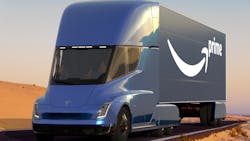Navistar recently partnered and bought a stake in TuSimple, a company focused on developing technology for fully autonomous trucks. Through this partnership, the truck OE plans to have SAE Level 4 autonomous trucks on the road—with no humans in the cab—by 2024.
This is just the latest of recent industry commitments in the development and adoption of autonomous vehicles.
Proactively planning for the next generation of commercial vehicles is imperative. Automated vehicles won’t be proven for widespread adoption by fleets until proper legislation is passed at the federal level to oversee and manage vehicle testing.
The January 2020 American Transportation Research Institute (ATRI) report, “Redefining the Role of Government Activities in Automated Trucking,” looked to assess the current landscape of autonomous truck testing in the U.S., highlighting a need for overarching guidance at the federal level to ensure technology adoption can move forward. Right now, it is up to individual state governments to regulate varied levels of vehicle testing.
“Trucking industry stakeholders believe the slow pace of federal leadership and guidance has allowed states to implement an incomplete patchwork of regulations through piecemeal legislation and executive action,” the report stated. “This, in turn, has likely hindered the development and adoption of AV (autonomous vehicle) and ADAS (advanced driver assistance system) technologies in the trucking industry.”
Specifically, it stagnates the deployment of trucks for interstate driving, which is ultimately the best use case for autonomous trucks since there are fewer obstacles and more consistent speeds achieved on U.S. highways compared to city settings.
This is the idea behind Navistar’s plans anyway, in which 95% of usage would be on highways between distribution centers, in the Southwest U.S.
Pushing formal legislation and a standardized process for testing is just the beginning. From there, the industry must address the eventual operation of these vehicles on U.S. roadways.
Current testing of autonomous technology, specifically Level 4 testing, involves someone overseeing the operation directly of that vehicle—whether that individual or team is in the cab or monitoring remotely.
For instance, proposed legislation in Minnesota suggests a human operator be on board a highly automated truck to monitor the automated system and to intervene and take manual control if necessary.
“The issue with developing policy specific to testing, and not more broadly on the operation of AV technologies, is that new policy will need to be developed to transition from testing to deployment,” stated the ATRI report. If and when autonomous trucks have advanced and are deemed operable without that individual directly monitoring the vehicle, it would not be legal to do so. At least according to this proposed law. It is important to consider long-term implications of currently proposed legislation. Or, at the very least, enact guidelines with established benchmarks that allow for the eventual operation of these vehicles on roadways once testing is completed and deemed safe enough for fleet operations.
Looking ahead, in order for fleets to adopt autonomous technology, there must also be technical standards and processes established for vehicle inspections and service.
How might a roadside inspection proceed when a trooper pulls over an automated truck? The Commercial Vehicle Safety Alliance (CVSA) is currently working to develop and test new inspection tools that support this next-generation technology. That technology could also bridge the gap for service technicians.
As it relates to technical standards, this should also address the current discrepancies with varied types of components such as sensors, cameras, lidar and radar, along with software used to monitor and control these systems.
Additionally, these components and systems require connectivity to communicate with one another. If every manufacturer is developing and implementing their own designs, it becomes increasingly difficult for spec’ing technologies to ensure seamless integration and operation.
Legislation must address changes to vehicle safety inspections, requirements for vehicle operation, and updates necessary for widespread vehicle connectivity that would allow these autonomous units to communicate with other vehicles and the surrounding infrastructure.
The same month ATRI released its report, U.S. Department of Transportation Secretary Elaine Chao introduced the Automated Vehicles 4.0 initiative which “seeks to ensure a consistent [United States government] approach to AV technologies, and to detail the authorities, research, and investments being made across the USG so that the United States can continue to lead AV technology research, development, and integration.” Ultimately, the latest version of this initiative looks to gain insights from 38 different U.S. agencies that may directly and indirectly have a stake in the development of AV technologies.
One thing is certain: the commercial vehicle industry will continue down the road of autonomous truck development and adoption through partnerships like Navistar and TuSimple. The question remains, how might standardized oversight expedite —or stall— those developments?
About the Author
Erica Schueller
Editorial Director | Commercial Vehicle Group
Erica Schueller is a former editorial director of the Endeavor Commercial Vehicle Group.

